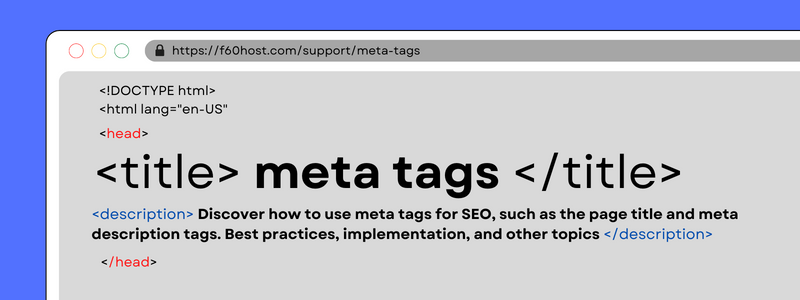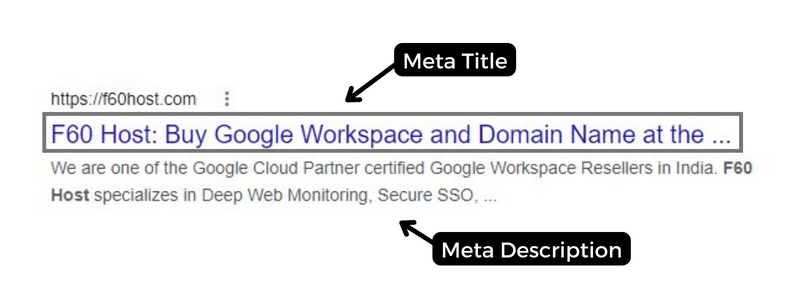Know everything about META TAGS: Especially for SEO

Discover how to use meta tags for SEO, such as the page title and meta description tags. Best practices, implementation, and other topics.
What Is the Definition of Meta Tags?
Meta tags are text snippets that describe the content of a page; meta tags do not appear on the page itself, but only in the page’s source code. Meta tags are small content descriptors that help search engines understand what a web page is about.
Does Meta Tags Help SEO?
Meta tags are the most fundamental aspect of SEO and ensuring that the pages on your site have a nice, solid foundation of optimization.
These are the tags that you add to your page’s header to describe the page in Google-friendly grammar.
What Are Meta Tags?
In the HTML of the page, meta tags provide information about the website.
These snippets of code are used by search engines to assess what the page is about and how relevant it is to the keyword being searched.

For instance, assume you’re looking for F60 Host. In that case, the description (at least the one it adds to the page) may appear in the search results as a paragraph fragment below the page title.
Lets get started with Meta Tags
One of the first things you’ll notice in a site audit report is the presence of meta tags. They appear above the page content in the header and provide vital information about a page.
These are only a few instances of what meta tags may do.
Meta tags come in a variety of forms, including title, description, keyword, picture alt text, robots, language, and even schema markup.
This post will concentrate on the most frequent ones, namely descriptions and keywords.
Related post 1: Core Elements of SEO: On-Page SEO and Off-Page SEO
Related post 2: Difference between Black Hat SEO and White Hat SEO
Page Title Tags
The key descriptive feature of your page is the page title tag.
Everyone sees your title tag when they come across your site in the Google search results.
This is why it is critical to ensure that it appropriately reflects the content of the page. If you’re writing a blog article, make sure the page title appropriately matches the content.
People should know where they are and what they are looking at.
While some sites continue to rank well while having lousy title tags, others don’t seem to care.
Why do some sites ignore the title tag while others proceed with their typical optimizations? It appears to be dependent on the sort of place. Some websites emphasise video, while others emphasise text. Some websites are focused on a single issue, while others cover several.
Google Discusses Meta Page Titles
We’ll soon be updating our long-standing help page about titles to reflect this recent change. However, our main advice on that page to site owners remains the same. Focus on creating great HTML title tags. Of all the ways we generate titles, content from HTML title tags is still by far the most likely used, more than 80% of the time. Google Search Central Blog, 2021
Measure the impact of optimizations you make to your site, for example, did changing those title and description meta tags improve traffic from search engines? Google, 2020
And more you can check out on Google Search Central
Meta Description Tags
The meta description tag is another key SEO meta feature.
This is the extremely brief paragraph that appears beneath the page title in the search results. Google will use it if you use a more accurate description than what is available from the on-page material.
This meta tag isn’t much of a ranking factor. Instead, it serves to entice and inform people about the page in general.
Meta Keywords Attribute
Meta Keywords are an example of a meta tag that no longer makes sense to use. Meta keyword tags may have been useful in the past, but not anymore.
Remember when your kindergarten teacher gave you a serious look and said, “If you don’t stop using those crayons while I’m talking, I’m going to take them away from you,” and you didn’t listen and, to your surprise, they were taken away? This is similar to what Google accomplished with meta keywords.
Meta Robots Attribute
With this attribute, you’re telling the search engines what to do with your pages:
- index/noindex – This tells the engines whether to show your page in search results or not.
- dofollow/nofollow – This tells the engines what to do with links on your pages: whether they should trust and “follow” your links to the next page or not.
So What’s Next?
We’ve discussed how meta tags can have a significant impact on search engine marketing. To summarise:
- Your search engine rankings might be influenced solely by the Title Tag.
- Users may be enticed to visit your site if you employ descriptive tags.
- The meta description could function as “organic ad text.”
- Most search engines consider meta keywords to be obsolete.
